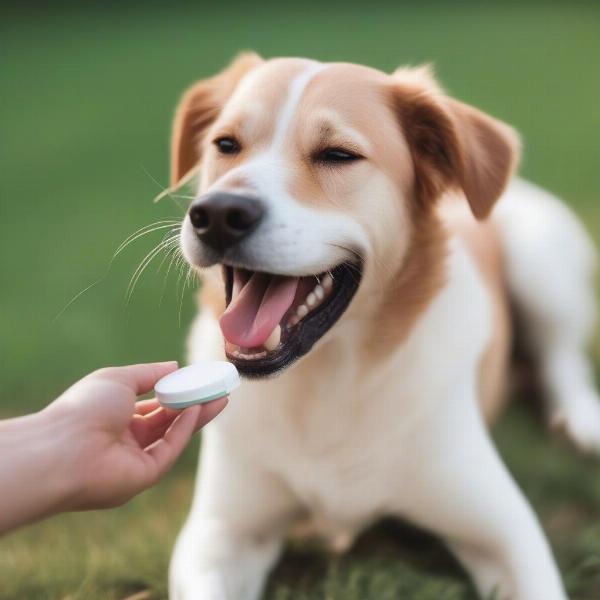Fleas are a common nuisance for dogs, causing itching, irritation, and even serious health issues. Finding a strong flea treatment for dogs that’s both effective and safe can be challenging, especially with so many options available. This guide will help you navigate the flea treatment landscape and choose the best solution for your furry friend. We’ll cover everything from identifying flea infestations to exploring different treatment options and preventing future outbreaks.
Understanding Flea Infestations in Dogs
Before diving into treatment options, it’s important to understand what you’re dealing with. Fleas are tiny, wingless insects that thrive on the blood of mammals, including our beloved dogs. Signs of a flea infestation include excessive scratching, biting at the skin, hair loss, and even small, dark specks (flea dirt) on your dog’s fur. Left untreated, fleas can lead to skin infections, allergies, and transmit diseases like tapeworm.
Exploring Strong Flea Treatment Options for Dogs
There are a variety of strong flea treatments for dogs available, each with its pros and cons. Choosing the right one depends on your dog’s age, health, lifestyle, and the severity of the infestation.
Topical Flea Treatments
Topical treatments are applied directly to your dog’s skin, typically on the back of the neck. They work by spreading through the oil glands and killing fleas on contact. Some popular topical treatments include fipronil, imidacloprid, and selamectin.
Oral Flea Treatments
Oral flea treatments are administered as a chewable tablet or pill. These treatments work systemically, killing fleas that bite your dog. Common active ingredients in oral flea medications include nufenoxim and fluralaner.
 Oral Flea Treatment for Dogs
Oral Flea Treatment for Dogs
Flea Collars
Flea collars release insecticide over time, providing continuous protection against fleas. Some collars also offer protection against ticks and other parasites. However, it’s crucial to choose a collar designed specifically for dogs and follow the manufacturer’s instructions carefully.
Flea Shampoos and Dips
Flea shampoos and dips can provide immediate relief from flea infestations. However, they typically only kill adult fleas and don’t offer long-term protection. They can be useful as part of an integrated flea control program.
Choosing the Right Strong Flea Treatment for Dogs
With so many options, how do you choose the right strong flea treatment for your dog? Consult your veterinarian. They can assess your dog’s specific needs and recommend the most effective and safe treatment. Factors to consider include your dog’s age, health, any existing allergies, and the severity of the flea infestation.
Preventing Future Flea Infestations
Preventing fleas is often easier than treating an infestation. Regularly vacuuming your home, washing your dog’s bedding, and using preventative treatments can significantly reduce the risk of fleas. Year-round flea prevention is often recommended, especially in warmer climates.
natural flea and tick spray for dogs
skin on dogs stomach turning black
safe guard canine dewormer for dogs
itch relief spray for dogs
Conclusion
Finding a strong flea treatment for dogs requires careful consideration of various factors. By understanding the different treatment options available and consulting with your veterinarian, you can effectively eliminate fleas and protect your furry companion from these pesky parasites. Remember, a proactive approach to flea prevention is always the best strategy.
FAQ
- How often should I treat my dog for fleas? The frequency of flea treatment depends on the product and your dog’s individual needs. Consult your veterinarian for specific recommendations.
- Are there natural flea treatments for dogs? Yes, there are some natural flea remedies, such as essential oils and diatomaceous earth. However, their effectiveness can vary, and it’s important to discuss them with your vet before using them.
- Can fleas on my dog infest my home? Yes, fleas can easily infest your home, laying eggs in carpets, furniture, and bedding.
- What are the signs of flea allergy dermatitis in dogs? Flea allergy dermatitis can cause intense itching, redness, hair loss, and skin infections.
- Can I use cat flea treatment on my dog? No, never use cat flea treatment on a dog. Some ingredients in cat flea products are toxic to dogs.
- How do I get rid of fleas in my house? Thoroughly vacuuming, washing bedding, and using flea sprays or foggers can help eliminate fleas in your home.
- What should I do if my dog has a severe flea infestation? Consult your veterinarian immediately. They can recommend the most appropriate treatment plan for your dog’s specific situation.
ILM Dog, a leading international pet care website, provides expert advice and resources on all aspects of dog care and well-being. We offer valuable insights into breed selection, health care, training, nutrition, grooming, and much more. For further information and personalized guidance, reach out to our team of experts at [email protected] or call us at +44 20-3965-8624. Visit ILM Dog for more expert advice and resources.